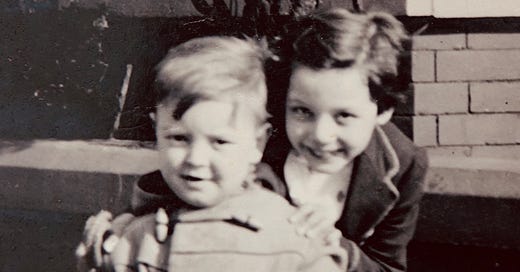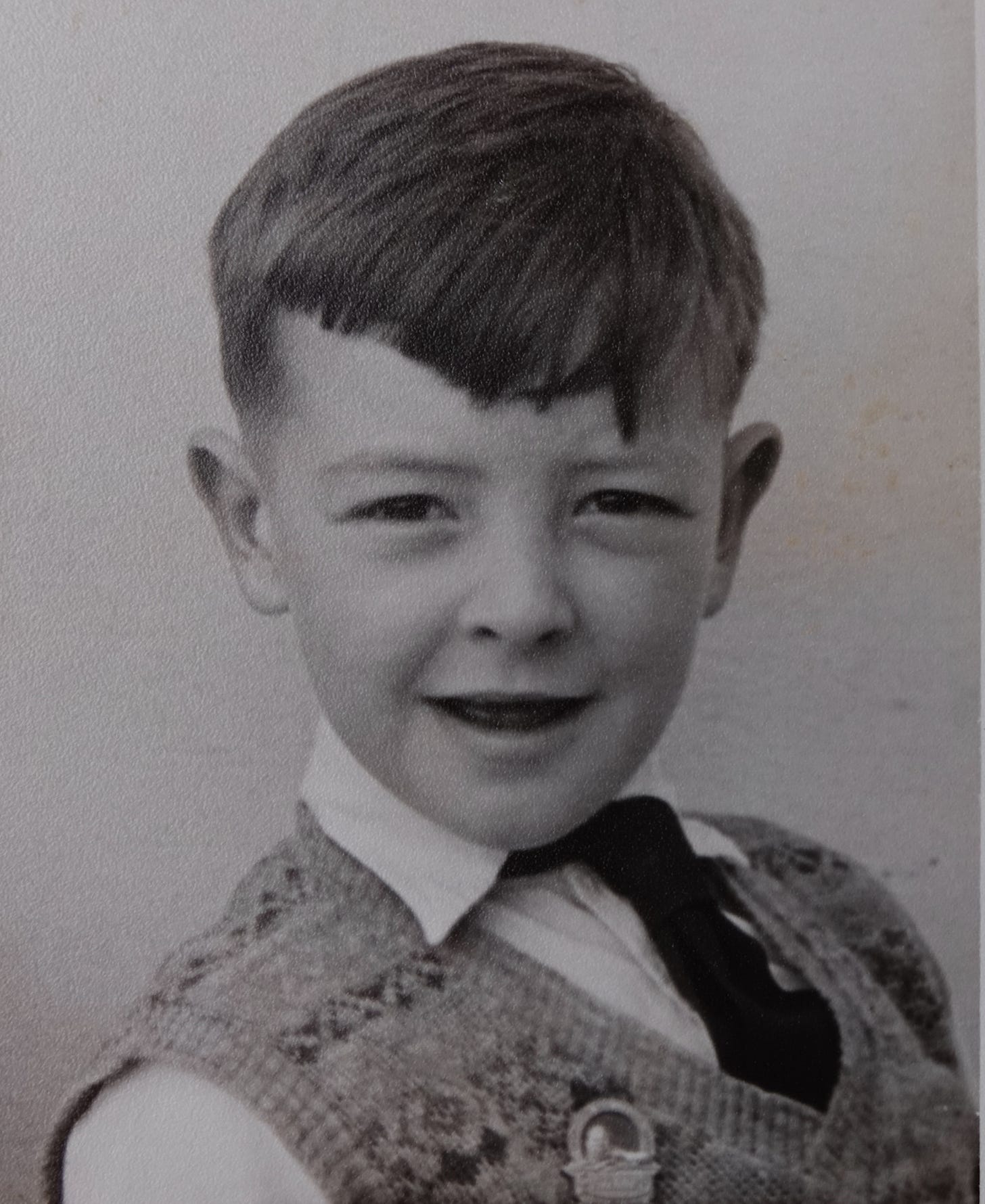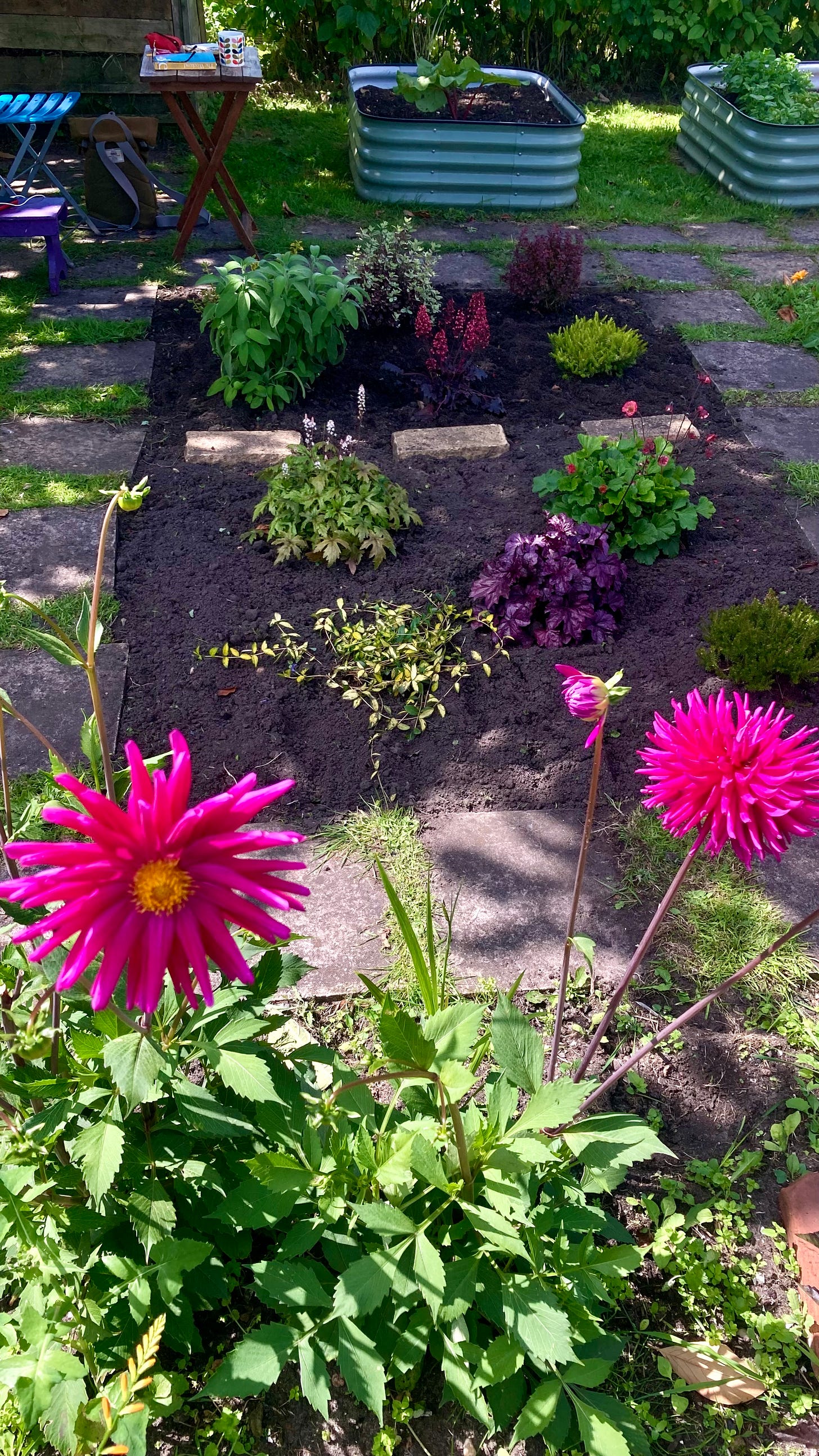Audio version here:
I’ve been up to something recently that a younger and less patient version of me would have dismissed as a load of morbid form-filling. Forms about getting older and making preparations for the kind of care I might need someday, up to and including the day I die. Hence the morbid.
But I didn’t find the doing of them morbid at all. And one in particular, the one I’m going to mainly feature here, brought me such a sense of peace and contentment with the things it asked me about that I’m calling what I wrote a self-portrait, and just the sort of succinct article I might have written to introduce myself as the writer of this still new Quiet place I’ve made up to write in. Except that what it really is, in fact, is quite a formal “Advance Statement of Wishes” about my future care, should that ever be needed. Done collaboratively with an organisation called Compassion in Dying.
I’ll say more about them afterwards. But for now here is my accidental self-portrait. Set out as if it’s a “Quiet” interview. Although of course it’s really with myself.
An Advance Statement
Of wishes, feelings, beliefs and values. Setting out care needs and preferences for when and if they’re needed.
Questions from Compassion in Dying
First let’s talk about your Values: The things that are important in your life?
I love walking, writing, reading, listening to music, gardening at the allotment and having conversations. Most of all I love talking with my wife Sarah, my daughter Clare and just a few close friends. Mostly done as one to one conversations rather than ever as part of a group.
I read mostly modern novels, some history, politics, nature, spirituality and also enjoy meandering around libraries finding subjects and books I haven’t explored yet.
My walking is mostly urban, around Liverpool and on the Wirral. Mostly on my own, or occasionally with Sarah or Clare.
I love and depend on listening to a lot of music. I like new to me music mostly, rather than just old favourites. The kinds found in Gramophone, Songlines and occasional Mojo magazines. From these magazines I make my own compilation playlists on my Apple Music account which I listen to rather than whole albums for much of the time. Should only whole albums of already familiar music be all that’s available at any time and place I’d like Joni Mitchell, David Bowie, Paul Simon, Scott Walker, Mary Chapin Carpenter, later Nick Cave, any Beach Boys, Mozart, Bach or a quiet classical compilation thanks, chamber music usually preferred.
I also love some radio. Particularly BBC Radio 3’s early morning programmes and their Night Tracks, Record Review and Private Passions. And I prefer everything else on Radio 3 to any other station, except for occasional Radio 4 discussions and podcasts, usually suggested to me by Sarah.
The things that are important to your identity?
I am “Ronnie” and hate being called Ronald or Ron. I’m a quiet and private person but always glad to meet people who’ll sit down and talk with me quietly and intelligently. I’m not much good at small talk or being overtly sociable and will not respond well to being patronised, talked down to or jollied along. I dislike parties and all forms of large social gatherings and group joinings in. Preferring, to any of them, to be left alone to read, listen to music or have those quiet conversations I mentioned. I’m what might be called introverted, and am happy that way.
I like to dress in good quality clothes that are neither formal nor outright casual wear. Possessing therefore few but decent quality hats, berets, jumpers, jeans, linen and moleskin trousers, wide fitting boots and shoes, and the several lovely and colourful waistcoats Sarah’s made for me.
Your spiritual or religious beliefs?
I am spiritual in an enquiringly agnostic kind of way. As I write this I would say I certainly don’t believe there is a personal God who is interested in each of us as individuals. But I think there could be something beyond our imaginations, some sort of elemental energy, which causes the universe and all its creatures to exist and continue. Something I’ve heard best described as “A cloud of unknowing.” But I don’t know. And I enjoy the not knowing, and the reading and thinking I do about spirituality, evolution and eternity. More than feeling I’d ever want to pick any single existing belief system and stick with it.
The things you don’t like?
Bossiness, officiousness and all forms of arrogance, intolerance, discrimination and bigotry. I dislike parties, as I’ve said, and virtually all forms of social joining in beyond quiet conversations. I loathe Christmas, for example. And never take part in any other public holidays. And don’t at all mind being alone, in fact I like it. As long as I have music, things to read and a way of writing (particularly on the mini iPad and its portable keyboard where I’ve been writing these answers now).
Other things not liked? I’m very allergic to cats and don’t generally like other animals around me either.
About Your Care:
Important information to know when caring for you?
I like to get up early, have a shower and will sometimes go out for a walk before breakfast. For breakfast I like my own fresh ground black coffee and also, most days, granola with some yoghurt and fruit. Though some days I prefer not to eat at all, before going out on a longer than usual walk of 8 to 10 miles or more. And taking a picnic with me.
At the moment I can do all my caring independently or with Sarah. And suspect I’ll always have a useful stubborn streak about continuing with that situation.
Your food needs and preferences?
I’m a vegetarian and have been now for over half my life. But have few other foods restrictions beyond using walking, low sugar foods and occasional fasts to keep my weight down to between 10.5 to 11 stone, along with my blood sugar average healthily low, and so stop my cholesterol levels getting too high.
The place you would like to be cared for?
I love being in my own home, caring for and being cared for by my wife Sarah. But for later life or palliative care I’m happy to recognise the time could come when it would be better for each of us if I were to be looked after in a home or a hospice.
Your Treatment: any conditions or illness now?
I currently take blood pressure and cholesterol medicines. And after a black out early in 2023 I’m an outpatient at a cardiology clinic, where their testing has revealed an occasionally malfunctioning aortic heart valve that’s now regularly monitored for a possible surgical replacement.
On an everyday sort of level though, while I think of it, I’m not afraid of needles or other necessary minor treatment related pains.
Things that are important to you in relation to your health?
Beyond what I’ve just said, I don’t wish to be kept alive unnecessarily once I’m beyond making further judgments about treatment for myself. To enable such a judgement I’ve made a Living Will, an Advance Decision to Refuse Treatment which is held as a Lasting Power of Attorney by my wife Sarah Horton, or if she has pre-deceased me by my daughter Clare Melhuish. This has also been given to my GP to place on my medical records.
Other general health stuff that’s important to me is that I like to get outside to walk, every day if possible, and to eat well but little. I don’t drink alcohol, haven’t for years now and have never smoked. I love good coffee, and also believe that music, reading, allotmenting, walking and staying clear of the stress social gatherings cause me are good for my health too.
Keeping my weight down as well, has reduced a previous risk of becoming pre-diabetic and has much reduced earlier tendencies to asthma and eczema. So that’s important to me.
The things you would prefer not to happen to you?
I would prefer not to be taken to a hospital when I could be better cared for at home. But I’m not stupid and recognise that some care and treatments can only be carried out by skilled doctors and staff in hospitals. Or eventually a hospice.
And I’m grateful, far beyond these words, for the existence of the National Health Service and to whoever from within it has the grace and responsibility to care for me.
Compassion in Dying
All of which, once it had been written down for whenever it might be needed was surprisingly satisfying in a “Now all that’s been said and done I can get on with my life” kind of way. As was the completion of all three of the forms I’ve filled in. All mentioned during the course of what you’ve just heard or read:
The setting up of a Lasting Power of Attorney so someone else, Sarah or my daughter Clare, the two people I love and trust absolutely, can take decisions about my health if I ever become unable to do so;
Making an Advance Decision to Refuse Treatment, also known as a Living Will, about conditions where I’d not want my life to be unnecessarily prolonged;
And the third, the one you’ve just read or heard most of, an Advance Statement of Wishes about my future care, should it be needed.
The idea behind all of these being that they’re best thought about and done, as they have been, while you don’t immediately need them, and have the full mental capacity to take all the quite complex mental and emotional decisions involved in setting them up.
They’re still forms though and at first I thought I’d probably need some legal help with doing them. But when the help turned out to be both expensive and somehow impersonal, despite the life and death nature of what we’d be discussing, Sarah had a nose around and found the registered charity Compassion in Dying. Whose help was so practical and thorough I’m not going to even try and explain any more about what I’ve been doing myself. As you can get much better explanations and help on their website than I could ever give you, including why you might want Compassion In Dying’s help someday too, either for yourself or someone you love.
So here’s their full website: Compassion in Dying.
The section about Lasting Power of Attorney
The section about a Living Will, an Advance Decision to Refuse Treatment
And the one about an Advance Statement of Wishes
Passed on with my appreciation and thanks.1
Compassion in Dying is a registered charity and their help is free, or as I’d prefer to call it priceless. But they are also grateful for donations, of course.







